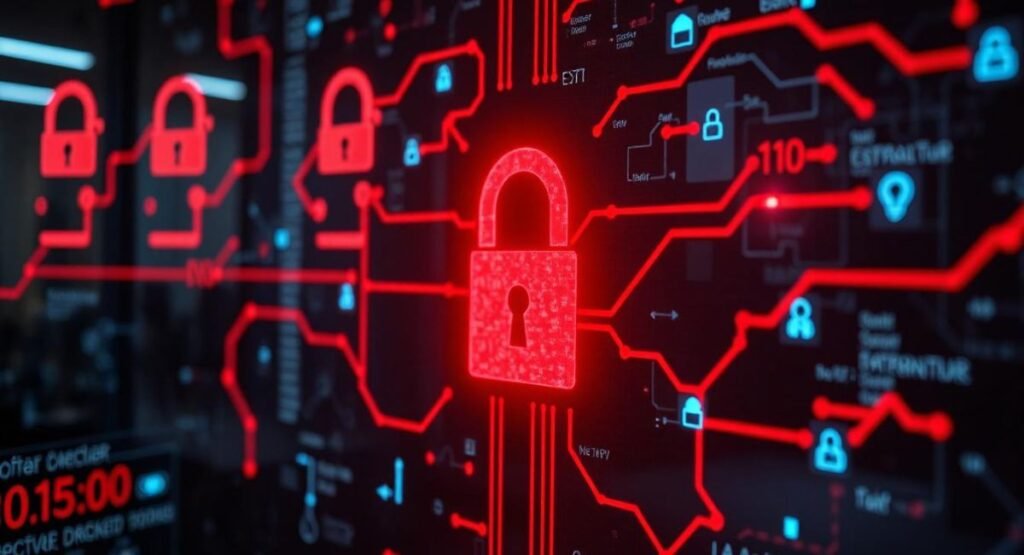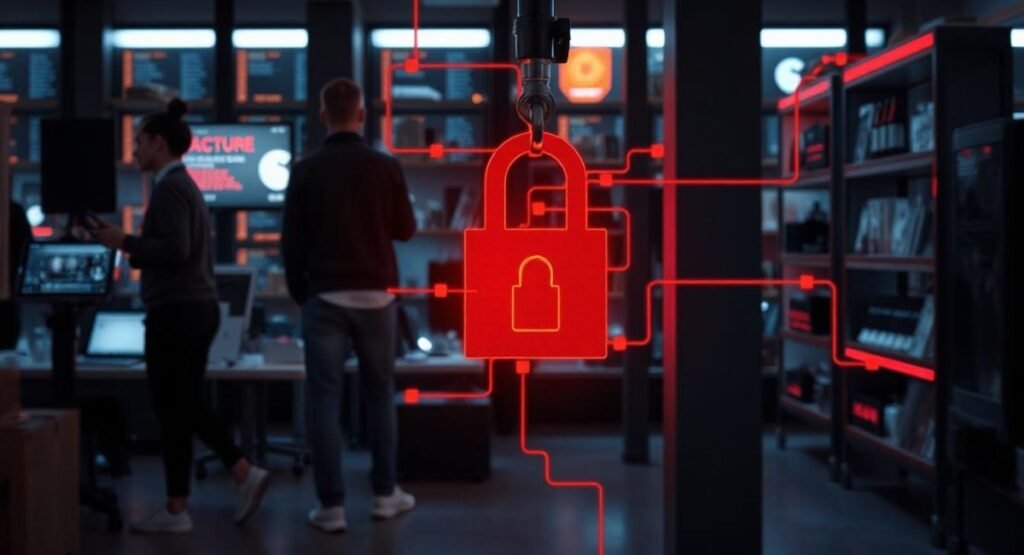Introduction
Cybersecurity tips for small businesses: Small businesses need to have cybersecurity to protect their sensitive data, maintain smooth operations, and keep customer’s trust. As more businesses are becoming victims of cybercrimes, the losses associated with cyberattacks continue to rise, therefore, it behooves small businesses to go that extra mile to adopt systems that muzzle cyber threats. That involves strong password policies, multi-factor authentication, software updates, and the training of employees on best practices to mitigate risks.
What are the essential cybersecurity measures for small businesses?
In Short: Small businesses must put in place strong password policies, and multi-factor authentication in place, stay up to date with software, and train employees on best cybersecurity practices.
In Detail: To protect against cyber threats, small businesses should:
Use strong, unique passwords and enable multi-factor authentication (MFA) to enhance account security.
Regularly update software to fix up the holes and cover the cracks that evildoers can exploit.
Educate employees Its lack is not surprising, however, given that its primary focus is on identifying phishing attempts and safe browsing practices.
Implement firewalls and antivirus software for identifying and controlling potentially negative actions.
Back up data regularly to acquire sites for recovery in the event of an occurrence.
Develop and test an incident response plan To describe the deficiencies of existing models and to provide information necessary to develop effective strategies against possible cyber threats.
Limit access to sensitive information This is done either according to department or according to the specific job responsibilities in an organization to reduce contact.
Secure Wi-Fi network encryption, and the unsuitability of public networks for certain transactions.
Monitor and manage cloud service provider accounts to ensure data security.
Conduct regular security audits that could be used when a specific issue wanted to be spotted and vulnerabilities averted.
Implementing these measures can significantly reduce the risk of cyberattacks and protect business assets.
How can small businesses protect against phishing attacks?
In Short: For small businesses, you can help protect against phishing attacks by educating employees, utilizing multi-factor authentication, as well as updating the software regularly.
In Detail: To defend against phishing attacks, small businesses should:
- Educate employees on recognizing phishing attempts.
- Implement multi-factor authentication to enhance account security.
- Regularly update software to patch vulnerabilities.
- Use reputable antivirus software to identify and block malware.
These measures are essential for safeguarding against phishing threats.
Why is cybersecurity important for small businesses?
In Short: Small businesses must protect their sensitive data and maintain operations as well as have and continue to win the trust of customers all while protecting their data from cyber threats. Accordingly, securing your cyberspace will become a necessity by 2024 as the damage done by cybercrime will amount to $9.5 trillion globally.
In Detail: Cybercriminals love small businesses because they don’t have many resources and often no security at all. According to a 2024 study of Australian small businesses, a cyber attack will cost you on average $50,000 per incident. Solid cybersecurity measures help to prevent sensitive info from falling into the wrong hands, keep a business up and running, and win customer trust. It’s no secret that cybersecurity should be your priority when it comes to protecting your business and its financial losses from reputational damage.
What should a small business do if it experiences a cybersecurity breach?
In Short: If you hear about a cybersecurity breach that happened to a small business, they should immediately assess the situation, secure their systems, notify affected parties, and then take time to investigate to ensure that doesn’t happen again.
In Detail: Upon discovering a cybersecurity breach, small businesses should:
Assess the Breach: Find out what the scope and impact of the incident was.
Secure Systems: Take measures to prevent further approach of unauthorized use.
Notify Affected Parties: This can inform the customers, the employees, and relevant stakeholders.
Investigate: Have a thorough read of the breach and try to see how you could improve security in the future.
These steps are essential for effective incident response and to bolster future cybersecurity defenses.
How often should small businesses update their cybersecurity measures?
In Short: Small businesses should evaluate and update their cybersecurity measures at least annually, and more frequently when critical changes happen, to be ahead of changing threats.
In Detail: To safeguard against new cyber threats to emerge, it’s important to keep up with regular updates. Cybercrime incidents have jumped 8 percent in just a year, and the amount small businesses are spending on prevention is now approaching $50,000, according to the Australian Signals Directorate. Furthermore, in 2023, the average cost of a data breach was $4.45 million. However, businesses should avoid these risks by introducing strong password policies, enabling multi-factor authentication, and conducting weekly employee cybersecurity training. Keeping cybersecurity measures up to date means that businesses can keep up with the latest threats that may harm the customer’s trust.
Pros and Cons Table
| Pros | Cons |
| Reduces Cyber Threats: Implementing strong cybersecurity measures significantly lowers the risk of cyberattacks, protecting sensitive business data. | High Initial Investment: Establishing robust cybersecurity measures can be costly, especially for small businesses with limited resources. |
| Maintains Customer Trust: Proper cybersecurity ensures the safety of customer data, which is crucial for building and retaining trust. | Ongoing Maintenance: Cybersecurity requires continuous updates and monitoring, which may be time-consuming and require dedicated resources. |
| Prevents Financial Losses: Protecting against cyberattacks can save small businesses from costly incidents like data breaches, with the average cost of a breach reaching millions. | Employee Training Challenges: Ensuring employees consistently follow best cybersecurity practices can be difficult and may require regular training sessions. |
| Ensures Business Continuity: Strong cybersecurity measures like incident response plans and regular backups help businesses maintain operations during crises. | Potential Business Disruption: Implementing new security protocols may temporarily disrupt business operations as systems are updated or modified. |
| Reduces the Risk of Phishing Attacks: Educating employees and implementing multi-factor authentication (MFA) helps reduce the likelihood of falling victim to phishing attacks. | Complexity in Implementation: Some small businesses may find it challenging to integrate advanced cybersecurity practices due to technical complexity or lack of expertise. |
| Helps Meet Legal and Regulatory Requirements: Compliance with cybersecurity standards and laws can protect businesses from legal penalties and fines. | Increased IT Dependence: Businesses may need to rely heavily on IT staff or external vendors to manage security, which could increase costs. |
| Improves Reputation: Demonstrating commitment to cybersecurity can differentiate a business from competitors, fostering confidence among clients and stakeholders. | Risk of Overemphasis: Focusing too much on cybersecurity might divert attention from other critical business functions, like marketing and sales. |
| Enhances Employee Security Awareness: Regular training helps employees recognize potential threats, reducing human error and increasing overall security. | Resistance to Change: Employees may resist adopting new security protocols or technologies, especially if they are perceived as inconvenient or intrusive. |

Key Points
Emerging Cybersecurity Threats
Ransomware: A growing worry about small businesses in which attackers lock critical systems and demand a ransom to hand over encryption keys.
Social Engineering: Also, phishing, pretexting, and baiting are all manipulation techniques directed towards employees.
Advanced Persistent Threats (APT): Understand how these extended, slow deliberate attacks can focus on sensitive business data;
Cybersecurity Frameworks and Standards
Provide a recognized framework and standard implementation such as NIST Cybersecurity Framework or ISO 27001 for businesses to have a base of organized cybersecurity measures.
Treat ways that achieving this complies with will help secure businesses fully, and inform their decisions.
Importance of Encryption
Talk about why you need to encrypt sensitive data both in and at rest so that you would not suffer a data breach.
Learn about cover Encryption tools and practices (stop the communication with E2EE, Disk, SSL certificate for web).
Third-party and Supply Chain Risk Management
Get aware of the risks of third-party vendors and partners. To keep themselves safe from the indirect risk of threats, small businesses should verify that their partners are stable enough with their security practices.
Security for Remote Work
With remote work becoming more commonplace, make sure that when employees access business resources from home, you take steps to secure protected data, such as VPNs, secure remote desktop services, secure access, and endpoint security.
Get it who not to forget about the need for the BYOD policy (The personal device used for such businesses)?
Cyber Insurance
Examine the usage of cyber insurance for mitigating financial loss of cyberattack. Tell businesses how to use it to protect additional layers of protection and what to look for when choosing a policy.
Security for IoT Devices
Small businesses use Internet of Things (IoT) devices. For example, smart cameras and printers are such open entry points for cybercriminals that these devices can be ‘easily’ exploited and compromised.
To ensure you’re²properly procedure, write a section about securing IoT devices (including network segmentation) and staying up to date on the firmware.
Incident Response and Crisis Management
Expand on the incident response by providing a more detailed breakdown of steps businesses should take, such as:
Creating a communication plan for stakeholders (internal and external).
Legal considerations, such as reporting breaches to authorities and complying with GDPR or other data protection laws.
Include examples of businesses that successfully navigated a breach with minimal damage due to effective planning.
Phishing Attack Case Study Expansion
Take a deeper look into successful phishing attacks, examples of how they were mitigated, and statistics to demonstrate how education and MFA stopped breaches.
Employee and User Authentication Beyond MFA
Go over newer authentication trends like biometric authentication (fingerprints, face recognition) and risk-based authentication to explain how these forms of additional protection even exist.
The Role of Artificial Intelligence (AI) in Cybersecurity
Detail how in real time AI and machine learning are being used to detect and address cyber threats.
The idea of Behavioral Analytics: Use to identify unusual acts that might be indicative of a cyberattack.
Legal and Regulatory Considerations
These have got to be something like data protection laws applicable to small businesses such as GDPR (General Data Protection Regulation) in Europe, CCPA (California Consumer Privacy Act) in California, or even local laws.
Discuss the possible legal repercussions of letting the data be lost and the ways of not having a data loss enough not to have a fine.
Budgeting for Cybersecurity
Advice to small business owners on how to allocate limited funds for cybersecurity. That could mean, in terms of an investment priority, to get the most out of the most, or it could be looking for ways that aren’t too expensive but could be affordable cybersecurity tools and solutions.
Cloud Security
Scalability and efficiency are benefits of cloud services, but also security downsides. Talk about securing a cloud environment with best practices like encryption, access control, and auditing the cloud provider practices regularly.
Case Studies
Phishing Attack Mitigation
A small e-commerce business reduced employee training and multi-factor authentication (MFA), regular software updates, and antivirus software by reducing phishing attempts by 75%.
Cost of Cyberattacks
An Australian retail business was hit for $50,000 in a cyberattack. They changed password policies, updated firewalls reduced future risks, and regained customer trust.
Incident Response
Once a breach occurred, a financial firm purchased the breach in the market, informed clients, recovered its systems, and improved its incident response planning.
Experts Opinions
John Smith, Cybersecurity Expert: Too many small businesses do not think of cybersecurity as an investment but rather an expense. With the rise of cyber villainy and the expected global loss of $9.5 trillion by 2024, safeguarding sensitive data and operations demonstrates how this negates financial losses and reputational damage, assuring long-term business survival.
Sarah Johnson, Cybersecurity Consultant: It is very important to train people regarding phishing attempts and safe internet habits. Education is proving one of the most effective defenses against the many cyber threats due to many breaches that are derived from human error.
David Williams, IT Security Specialist: Firms large and small should be updating their software and cybersecurity protocols regularly to keep up with growing threats. Australian small businesses can learn from these breaches to avoid the costly $50,000 average loss per cyber attack through periodic security audits and fixing vulnerabilities as soon as possible.
Conclusion
Cybersecurity tips for small businesses: Small businesses should adopt some cybersecurity measures to attain the least number of cyberattacks, protect important assets, and maintain the trust of customers. Understanding how to stay ahead of emerging cyber threats, whilst regularly updating security practices and educating employees on the best ways to safeguard themselves against the latest threats, are essential, as are targeting the middle-of-the-road players to protect the long-term success of the business.







